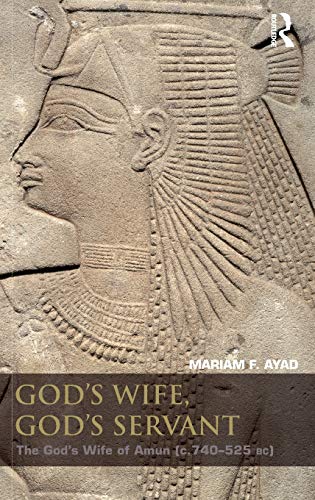God's Wife, God's Servant
The God's Wife of Amun (ca.740-525 BC)
Mariam F. Ayad
BOOK REVIEW

In the intricate tapestry of ancient civilizations, the role of women often remains shrouded in mystery, yet no figure embodies the complexities of power, spirituality, and influence better than the God's Wife of Amun. In Mariam F. Ayad's compelling work, God's Wife, God's Servant: The God's Wife of Amun (ca. 740-525 BC), we are catapulted into a world where divine duties intertwine with earthly politics, unraveling the fabric of ancient Egyptian society in ways that will leave you breathless.
This isn't merely a historical account; it's a piercing exploration of how a single title could wield unparalleled authority, often surpassing even that of kings. The God's Wife of Amun was not only a priestess but a pivotal player in the socio-political landscape of her time, straddling the delicate line between the sacred and the secular. As Ayad meticulously dissects this intense duality, she paints a portrait of a woman (or women, as the title could transcend generations) whose existence was steeped in ritualistic burdens and divine expectations.
The life and times of the God's Wife offer a narrative that is both enlightening and emotionally charged. Consider the implications of a woman - a priestess - being tasked with facilitating the connection between the gods and the people, a role traditionally dominated by male figures. This inversion of gender roles ignites a firestorm of ideas about power dynamics and spiritual authority. It's not just about the veil of ceremony; it's about the palpable tension of holding such immense influence over life and death, crops and fertility, not to mention the socio-political affairs of the Egyptian state.
Ayad's depth of research is both commendable and inspirational, as she brings historical sources, archaeological evidence, and intricate social nuances into vibrant life. The emphasis she places on the intertwining of the God's Wife's role with the worship of Amun reveals how deeply entrenched religion dictated the cultural and political environments of ancient Egypt. This examination forces readers to confront hard truths about the nature of power - how it can uplift and oppress in equal measure, depending on who wields it.
Readers have been spellbound by Ayad's prose, often remarking on her ability to transform dense historical narratives into a flowing account that feels almost like a richly detailed novel. Critics have pointed out that her adept storytelling transcends traditional academic writing, making God's Wife, God's Servant accessible to a broader audience craving to uncover the hidden narratives of women in history. One reviewer passionately articulated, "Mariam shines a light on a shadowed figure, transforming what we thought we knew about women in ancient Egypt into a riveting revelation."
However, the book is not without its critiques. Some historians argue that Ayad's interpretations at times lean towards romanticism, an almost idealized view that could oversimplify the harsh realities faced by women in the ancient world. Yet, whether one agrees or disagrees with these perspectives, what remains undebatable is the book's ability to provoke thought and discussion about gender roles, spirituality, and the spectrum of influence in historical contexts.
The journey through God's Wife, God's Servant prompts an inquiry into how the presentation of the divine impacts societal structure, urging readers to reflect on the complexities of spiritual authority in their lives today. As Ayad delves into the religious, the political, and the intersecting spheres of influence, one can't help but draw parallels to the modern world, where power remains a contested terrain.
This narrative compels you not just to learn, but to feel. The emotions that resonate through the pages are palpable, challenging our understanding of identity, governance, and the divine dance between the sacred and the worldly. Each chapter digs deeper, inviting you to not only witness history but to engage with it on an emotional level, transforming what could be a mundane historical account into a saga of survival, power, and femininity.
As you contemplate the legacy of the God's Wife of Amun, it becomes clear that Ayad's work is not just an academic endeavor; rather, it serves as a clarion call to appreciate the hidden figures of our past. By illuminating their stories, we gain not merely knowledge but insight into the undercurrents that have shaped society throughout time.
Here lies an opportunity to immerse yourself in a life that dances between devotion and authority, revealing how history, though recorded, often overlooks the intimate connections that define it. Engage with God's Wife, God's Servant, and allow yourself to experience the bewitching complexity of power wielded by women long before our modern constructs of gender emerged. The echoes of their actions still reverberate through time, demanding our attention and, ultimately, our respect. ✨️
📖 God's Wife, God's Servant: The God's Wife of Amun (ca.740-525 BC)
✍ by Mariam F. Ayad
🧾 232 pages
2009
#gods #wife #gods #servant #gods #wife #amun #ca740525 #mariam #ayad #MariamFAyad